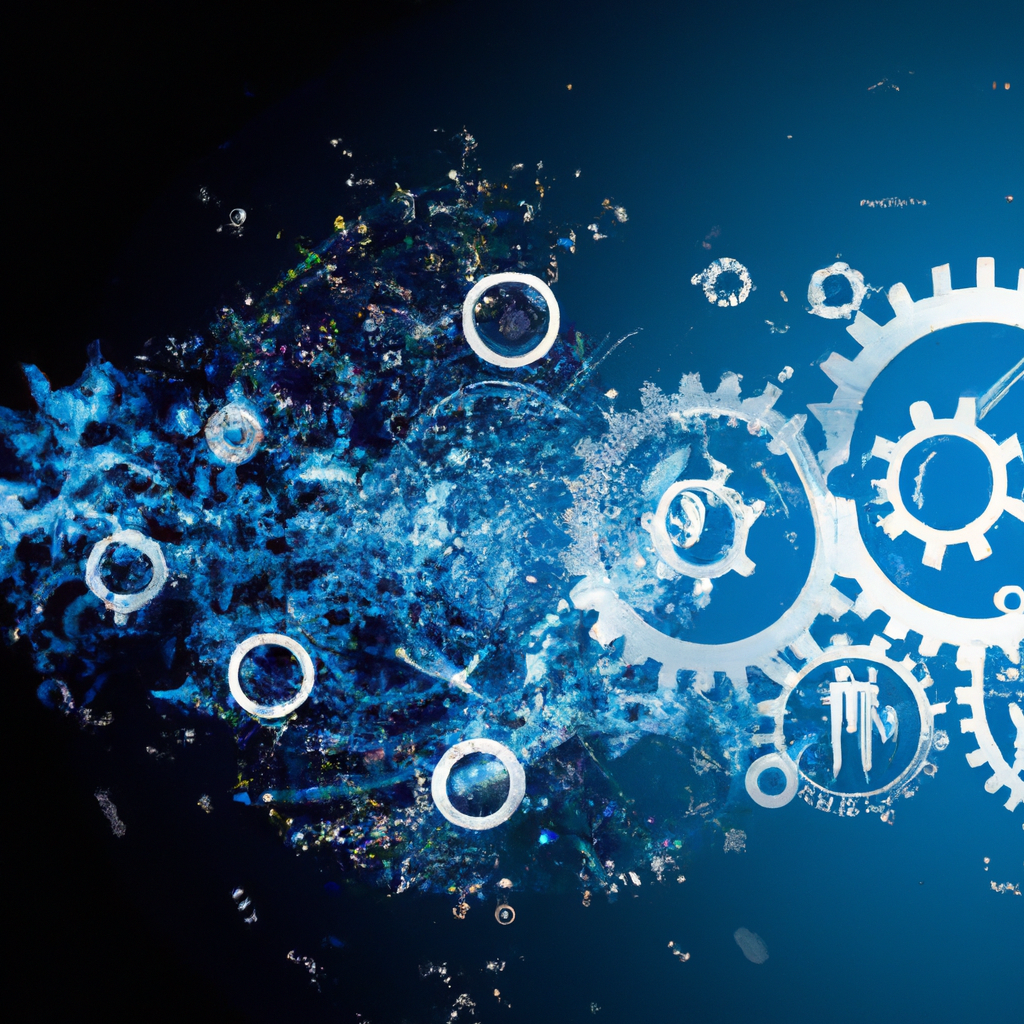Imagine a world where marketing is not just about targeting the right audience or creating catchy advertisements, but about having an insightful understanding of each individual customer’s preferences, behaviors, and desires. Picture a future where businesses can personalize their marketing messages on a mass scale, predicting and fulfilling consumer demands before they even arise. This is not a distant fantasy; it is a reality that Artificial Intelligence (AI) is paving the way for. By harnessing the power of AI, marketers can gain a competitive edge by unlocking the secrets of data analysis, automation, and personalization, making it clear that AI is indeed the future of marketing.
Improving Customer Experience
Personalized Recommendations
AI-powered algorithms have revolutionized the way companies engage with their customers. By analyzing vast amounts of data, AI can now provide personalized recommendations to users based on their preferences, past purchases, and browsing history. This not only enhances the customer experience but also increases the chances of conversion and repeat business. With personalized recommendations, customers feel understood and valued, leading to increased satisfaction and loyalty.
Enhanced Customer Service
AI-driven technology has paved the way for enhanced customer service experiences. Chatbots, for instance, can quickly and accurately respond to customer inquiries, providing instant solutions and support. These intelligent chatbots are available 24/7, eliminating the need for customers to wait for a human agent to assist them. AI-powered chatbots can handle a wide range of queries, from product information to order tracking, ensuring a seamless and efficient customer service experience.
Targeted Advertising
Precise Audience Segmentation
AI has revolutionized the way advertisers identify and target their audience. With AI-powered algorithms, marketers can now analyze vast amounts of data to identify precise audience segments based on demographics, behavior, interests, and more. This enables businesses to create targeted campaigns that resonate with specific customer groups, increasing the effectiveness of their advertising efforts.
Dynamic Ad Campaigns
AI enables dynamic ad campaigns that can adapt and evolve based on real-time data and customer behavior. By analyzing user responses and engagement, AI can optimize ad content, placement, and timing to maximize impact and increase conversion rates. Dynamic ad campaigns allow advertisers to deliver the right message to the right audience at the right time, resulting in a more efficient and effective advertising strategy.
Optimized Ad Placement
AI-powered platforms can optimize ad placement across multiple channels, ensuring that ads reach the most relevant and high-converting audiences. By analyzing data on customer behavior and preferences, AI can identify the most effective platforms, websites, and social media channels for ad placement. This optimizes the ad reach and increases the chances of conversion, ultimately improving the ROI of advertising campaigns.

Data Analysis and Insights
Predictive Analytics
AI’s ability to analyze vast amounts of data enables businesses to harness the power of predictive analytics. By analyzing historical data and current market trends, AI can identify patterns and make accurate predictions about future customer behavior, market trends, and industry developments. This empowers businesses to make data-driven decisions, optimize marketing strategies, and stay ahead of the competition.
Real-time Market Research
AI-driven tools can collect and analyze real-time market data, providing businesses with up-to-date insights on consumer preferences, competitor activities, and market trends. This real-time market research enables businesses to make agile and informed decisions, adjust marketing strategies on the fly, and seize emerging opportunities. Real-time market research powered by AI ensures that businesses stay relevant and adapt to changing customer demands.
Competitor Analysis
AI-powered tools can analyze competitor data, online activities, and marketing strategies to provide businesses with valuable insights and competitive advantage. By monitoring and analyzing competitor behavior, businesses can identify gaps in the market, capitalize on untapped opportunities, and stay ahead of the competition. AI-driven competitor analysis enables businesses to make informed decisions, refine their marketing strategies, and differentiate themselves from competitors.
Automated Content Generation
AI-powered Copywriting
AI can generate high-quality, engaging, and persuasive content at scale. AI-powered copywriting tools can analyze existing content, understand the target audience, and generate compelling copy that resonates with customers. This not only saves time and resources but also ensures consistent and high-quality content creation across various channels and platforms. AI-powered copywriting streamlines the content creation process and enables businesses to deliver engaging content that drives results.
Automated Video Creation
AI-powered tools can analyze existing video content, understand the target audience, and generate personalized videos at scale. By automating the video creation process, businesses can quickly and efficiently produce high-quality videos tailored to specific customer segments. Automated video creation allows businesses to engage with their audience through visual storytelling and deliver personalized messages, enhancing the overall customer experience.
Dynamic Landing Pages
AI enables the creation of dynamic landing pages that adapt and personalize content based on individual user preferences. By analyzing user behavior and preferences, AI can dynamically adjust landing page content to optimize engagement and conversion rates. Dynamic landing pages deliver personalized experiences to each visitor, increasing the chances of conversion and improving the overall customer journey. AI-powered dynamic landing pages ensure that each user receives a tailored experience that meets their needs and preferences.

Streamlining Marketing Operations
Automated Reporting
AI-powered reporting tools can automate data collection, analysis, and reporting processes, saving valuable time and resources. By automating routine reporting tasks, marketing teams can focus on strategic decision-making and campaign optimization. AI-powered reporting provides businesses with real-time insights and actionable information, empowering them to make data-driven decisions and track the performance of marketing efforts effectively.
Campaign Analysis and Optimization
AI-driven tools can analyze campaign performance, identify areas for improvement, and optimize marketing campaigns in real-time. By continuously monitoring and analyzing data, AI can provide actionable insights and recommendations to enhance campaign effectiveness and results. Campaign analysis and optimization powered by AI enable businesses to maximize ROI, improve targeting, and optimize messaging, ultimately driving better campaign outcomes.
Marketing Resource Allocation
AI can analyze data on marketing budget, channel performance, and customer behavior to optimize marketing resource allocation. By understanding which channels and strategies are driving the most impact, businesses can allocate resources effectively to maximize results. AI-powered resource allocation ensures that marketing budgets are allocated strategically and efficiently, allowing businesses to achieve their marketing goals while minimizing wastage and inefficiencies.
Social Media Management
Social Listening and Sentiment Analysis
AI-powered tools can monitor social media conversations, analyze sentiments, and provide businesses with valuable insights into customer preferences, opinions, and brand perception. By listening to social media conversations, businesses can better understand their audience, identify trends, and address customer concerns promptly. Social listening and sentiment analysis powered by AI enable businesses to cultivate a positive brand image, engage with customers, and tailor their marketing strategies to meet customer expectations.
Automated Social Posting and Scheduling
AI-driven tools can automate social media posting and scheduling, saving time and effort for marketing teams. By analyzing historical data, customer behavior, and engagement patterns, AI can schedule social media posts at the optimal times for maximum visibility and reach. Automated social posting and scheduling ensure a consistent and active social media presence, allowing businesses to effectively engage with their audience and drive brand awareness.
Audience Targeting
AI-powered algorithms can analyze vast amounts of data to identify and target specific audience segments on social media platforms. By understanding customer demographics, interests, and behavior, AI can guide businesses in creating targeted campaigns that resonate with their audience. Audience targeting powered by AI enables businesses to optimize their social media advertising efforts, increase engagement, and improve conversion rates.
Improved Search Engine Optimization (SEO)
Keyword Research and Optimization
AI-driven tools can analyze search patterns, keyword trends, and consumer behavior to guide businesses in optimizing their website for search engines. By identifying relevant keywords and creating optimized content, businesses can improve their search engine rankings and increase organic traffic. AI-powered keyword research and optimization ensure that businesses stay ahead of their competition in search engine results pages, increasing their visibility and driving more qualified traffic.
Content and Metadata Analysis
AI can analyze web content, metadata, and user behavior to improve the relevance and quality of website content. By identifying content gaps, optimizing metadata, and improving content structure, businesses can enhance their website’s SEO performance. AI-powered content and metadata analysis ensure that businesses provide value to their audience, improve search engine visibility, and drive organic traffic.
Link Building Strategies
AI-powered tools can analyze backlink profiles, identify quality link-building opportunities, and guide businesses in developing effective link-building strategies. By understanding the importance of backlinks in search engine rankings, businesses can build authoritative and relevant external links that improve SEO performance. AI-powered link building strategies enable businesses to increase their website’s authority, enhance their online presence, and boost organic search rankings.
Predictive Lead Scoring
Identifying High-Quality Leads
AI-powered algorithms can analyze vast amounts of data to predict a lead’s likelihood of converting into a customer. By analyzing historical data, customer behavior, and demographic information, AI can identify high-quality leads that are most likely to engage with a business and make a purchase. Predictive lead scoring allows businesses to prioritize their efforts on leads with the highest conversion potential, improving lead nurturing and sales outcomes.
Automated Qualification
AI-driven tools can automate the lead qualification process, saving time and resources for marketing and sales teams. By analyzing lead data, AI can accurately evaluate a lead’s readiness to be transferred to the sales team. Automated lead qualification ensures that only high-quality leads are passed to the sales team, optimizing the sales process and improving conversion rates.
Improved Conversion Rates
AI can analyze customer data, behavior, and engagement patterns to provide businesses with valuable insights into optimizing their conversion strategies. AI-powered recommendations and insights enable businesses to identify conversion bottlenecks, refine messaging, and improve the overall customer journey. AI-driven optimization ensures that businesses capture and convert qualified leads, maximizing conversion rates and driving revenue growth.
Enhanced Personalization
Segmentation and Customization
AI-powered algorithms can segment customers based on their preferences, purchase history, and browsing behavior. By understanding individual customer needs, businesses can personalize marketing messages, offers, and experiences, increasing customer engagement and conversion rates. AI enables businesses to deliver tailored marketing content that resonates with customers, creating a personalized and impactful customer experience.
Dynamic Content Delivery
AI can dynamically deliver content based on individual user preferences, behavior, and context. By analyzing real-time data, AI can identify the most relevant content to show to a specific user at a particular time, ensuring an engaging and personalized customer experience. Dynamic content delivery powered by AI allows businesses to deliver the right message to the right audience at the right time, enhancing customer engagement and building stronger relationships.
Behavioral Analysis
AI-powered tools can analyze user behavior, preferences, and engagement patterns to provide businesses with valuable insights into customer preferences. By understanding customer behavior, businesses can tailor their marketing strategies to meet individual needs and expectations. Behavioral analysis powered by AI enables businesses to anticipate customer needs, deliver personalized experiences, and build long-lasting customer relationships.
Continuous Learning and Adaptability
Machine Learning Algorithms
AI-powered machine learning algorithms can continuously learn from customer data, market trends, and historical patterns to refine marketing strategies and improve outcomes. By analyzing large volumes of data, AI can identify patterns, make predictions, and optimize marketing efforts in real-time. Machine learning algorithms enable businesses to adapt their marketing strategies dynamically, ensuring that they stay effective and relevant in a rapidly changing business environment.
Feedback-driven Optimization
AI-powered tools can collect and analyze customer feedback to refine marketing campaigns and strategies. By understanding customer preferences, pain points, and satisfaction levels, businesses can continuously improve their marketing efforts and customer experiences. Feedback-driven optimization powered by AI ensures that businesses listen to their customers, address their concerns, and deliver value that exceeds expectations.
Market Trend Monitoring
AI can monitor real-time data, market trends, and industry developments to provide businesses with valuable insights into emerging opportunities and potential threats. By staying informed about market trends, businesses can proactively adjust their marketing strategies, adapt to changing customer demands, and drive innovation. Market trend monitoring powered by AI allows businesses to stay ahead of the curve, seize new opportunities, and maintain a competitive edge.
In conclusion, AI is the future of marketing because it enables businesses to enhance the customer experience, optimize marketing efforts, and drive better results. From personalized recommendations to continuous learning and adaptability, AI-powered tools and technologies empower businesses to deliver tailored experiences, optimize campaigns, and stay ahead of the competition. By harnessing the power of AI, businesses can unlock new possibilities, increase customer engagement and loyalty, and drive long-term success in the dynamic and evolving world of marketing.
